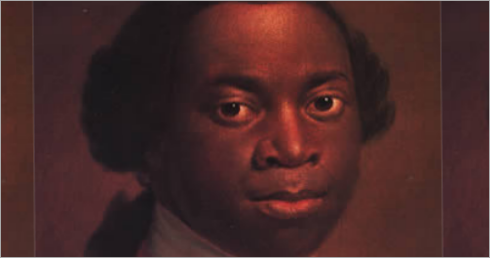
Ottobah Cugoano, also known as John Stuart (c.1757 – after 1791), was an African abolitionist who was active in England in the latter half of the eighteenth century. Captured and sold into slavery at the age of 13 in present-day Ghana, he was shipped to Grenada. In 1772 he was purchased by an English merchant who took him to England, where he was freed. Later working for the Cosways, he became acquainted with British political and cultural figures, and joined the Sons of Africa, abolitionists who were Africans.
Ottobah Cugoano was born in Africa in about 1757. As a child he was kidnapped by slave-traders. He later recalled: “I was early snatched away from my native country, with about eighteen or twenty more boys and girls, as we were playing in a field. We lived but a few days’ journey from the coast where we were kidnapped… Some of us attempted, in vain, to run away, but pistols and cutlasses were soon introduced, threatening, that if we offered to stir, we should all lie dead on the spot.”
Cugoano was placed on a slave-ship bound for the West Indies. “We were taken in the ship that came for us, to another that was ready to sail from Cape Coast. When we were put into the ship, we saw several black merchants coming on board, but we were all drove into our holes, and not suffered to speak to any of them. In this situation we continued several days in sight of our native land. And when we found ourselves at last taken away, death was more preferable than life; and a plan was concerted amongst us, that we might burn and blow up the ship, and to perish all together in the flames: but we were betrayed by one of our own countrywomen, who slept with some of the headmen of the ship, for it was common for the dirty filthy sailors to take the African women and lie upon their bodies; but the men were chained and pent up in holes. It was the women and boys which were to burn the ship, with the approbation and groans of the rest; though that was prevented, the discovery was likewise a cruel bloody scene.”
On his arrival he was sold as a slave to plantation owners in Grenada. According to Cugoano he was treated very badly: “Being in this dreadful captivity and horrible slavery, without any hope of deliverance, for about eight or nine months, beholding the most dreadful scenes of misery and cruelty, and seeing my miserable companions often cruelly lashed, and, as it were, cut to pieces, for the most trifling faults; this made me often tremble and weep, but I escaped better than many of them. For eating a piece of sugar-cane, some were cruelly lashed, or struck over the face, to knock their teeth out. Some of the stouter ones, I suppose, often reproved, and grown hardened and stupid with many cruel beatings and lashings, or perhaps faint and pressed with hunger and hard labour, were often committing trespasses of this kind, and when detected, they met with exemplary punishment. Some told me they had their teeth pulled out, to deter others, and to prevent them from eating any cane in future. Thus seeing my miserable companions and countrymen in this pitiful, distressed, and horrible situation, with all the brutish baseness and barbarity attending it, could not but fill my little mind horror and indignation.”
Ottobah Cugoano remained in the Caribbean until purchased by an English merchant. He was taken to England in 1772 where he was set free and was baptized “John Stuart” at St James’s Church, Piccadilly on 20 August 1773. Later he entered the service of the royal artist, Richard Cosway.
Cugoano became one of the leaders of London’s black community. In 1786 he played an important role in the case of Henry Demane, a black man who had been kidnapped and was about to be shipped to the West Indies as a slave. He contacted Granville Sharp, who managed to get Demane rescued before the ship left port. According to his biographer, Vincent Carretta: “Cugoano was one of the first identifiable Afro-Britons actively engaged in the fight against slavery. In 1786 he joined William Green, another Afro-Briton, in successfully appealing to Granville Sharp to save a black person, Harry Demane, from being forced into West Indian slavery. With Olaudah Equiano… he continued the struggle against slavery with public letters to London newspapers.”
Cugoano was taught to read and write. In 1787, with the help of his friend, Olaudah Equiano, he published an account of his experiences, Narrative of the Enslavement of a Native of Africa. Copies of his book was sent to George III, Edmund Burke and other leading politicians. He failed to persuade the king to change his opinions and like other members of the royal family remained against abolition of the slave trade. In his book Cugoano was the first African to demand publicly the total abolition of the slave trade and the freeing of all slaves.
In Thoughts and Sentiments on the Evil and Wicked Traffic of the Slavery and Commerce of the Human Species (1787) he criticised religious and secular pro-slavery arguments and demanded the immediate abolition of the slave trade and emancipation of all slaves. He also called for punishments for slave owners, including enslavement by their former slaves.
In 1793 Cugoano upset William Wilberforce by describing him as a hypocrite when he refused to support the campaign to end slavery in the British Empire. Vincent Carretta has pointed out: “No record has been found of Cugoano’s either having opened a school or having participated in settling Sierra Leone…. The cause, date, and place of Cugoano’s death, and the date and place of his burial are unknown.”
